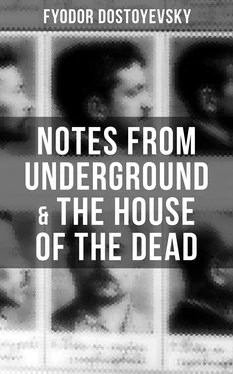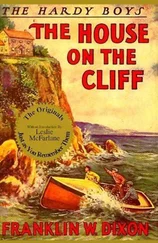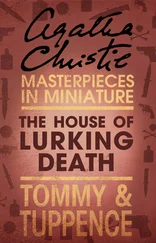The work was simply intended to give us something to do, as was understood on both sides; and accordingly we went to it apathetically. Things were very different when there was a useful job or some definite scheme to be carried out. In that case, although the men themselves derived no profit, they tried to get it done as soon as possible, and took a pride in doing it quickly. But when the labour was a matter of form rather than of necessity, no high-powered effort could be expected. We had to work until the eleven o’clock drum told us to cease.
The day was warm and foggy, the snow was on the point of melting. Our group walked towards the bank behind the fortress, our chains rattling beneath our garments; the sound was clear and ringing. Two or three convicts went to collect tools from the depot.
I walked ahead with the others, rather excited, for I was anxious to discover in what this field labour consisted, to what sort of work I was condemned, and how I should do it for the first time in my life.
I remember the smallest particulars. As we walked along we met a townsman with a long beard, who stopped and slipped his hand into his pocket. One man fell out, took off his cap and received alms-to the extent of five kopecks-then hurried back. The townsman made the sign of the cross and went his way. Those five kopecks were spent the same morning in buying scones of white bread which were shared equally amongst us. Some of my squad were gloomy and taciturn, others indifferent and indolent. There were some who kept up a perpetual chatter One of them was extremely gay, heaven knows why; he sang and danced as we went along, shaking and ringing his chains at every step. He was a huge fat man, the same who, on the day of my arrival at washing time, had quarrelled with one of his companions about the water, and had ventured to compare him to some sort of bird. His name was Scuratoff. He finished by shouting out a lively song of which I remember the burden:
‘They married me without my consent, When I was at the mill.’
Nothing was wanting but a balalaika.
His extraordinary good humour was justly reproved by several of the prisoners, who took offence at it.
‘ Listen to his row,’ said one of the convicts, ‘ why can’t he shut up?’
‘ The wolf has but one song, and this Tuliak is stealing it from him,’ said another whose accent proclaimed him a Little Russian.
‘Of course I’m from Tula,’ replied Scuratoff; ‘but we don’t stuff ourselves to bursting as you do in Pultava.’
‘Liar! What did you eat yourself? Bark shoes and cabbage soup?’
‘You talk as if the devil fed you on sweet almonds,’ broke in a third.
‘I admit, my friend, that I’m softly nurtured,’ said Scuratoff with a gentle sigh, as though he were really reproaching himself for his softness. ‘I was lapped in luxury from earliest childhood, fed on plums and dainty cakes. My brothers even now have a large business at Moscow: they’re wholesale dealers in the wind that blows-immensely rich men, as you may imagine.’
‘And what did you sell?’
‘I was very successful, and when I received my first two hundred’
‘Roubles? Impossible!’ interrupted one of the prisoners, struck with amazement at hearing of so large a sum.
‘No, my good fellow, not two hundred roubles, two hundred strokes. Luka! I say Luka!’
‘ Some have the right to call me Luka, but to you I’m Luka Kouzmitch,’ retorted a small, feeble convict with a pointed nose.
‘The devil take you, you’re really not worth speaking to; yet I wanted to be civil to you. But to continue my story. This is how it happened that I left Moscow. I received my last fifteen strokes and was then sent off, and was at’
‘But what were you sent for?’ asked another convict who had been listening attentively.
‘Don’t ask stupid questions. I was explaining to you how it was I did not make my fortune at Moscow; and yet you can’t imagine how anxious I was to be rich.’
Several prisoners began to laugh. Scuratoff was one of those lively persons, full of animal spirits, who take a pleasure in amusing their graver companions, and who, as a matter of course, received no reward except insults. He belonged to a type of men of whose characteristics I shall, perhaps, have occasion to say more.
‘And what a fellow he is now!’ observed Luka Kouzmitch. ‘His clothes alone must be worth a hundred roubles.’
Scuratoff had the oldest and greasiest sheepskin imaginable. It was patched in many different places with pieces that scarcely hung together. He looked at Luka attentively from head to foot.
‘It’s my head, friend,’ he said, ‘my head that’s worth the money. When I said goodbye to Moscow I felt that at any rate my head was going to make the journey on my shoulders. Farewell, Moscow, I shall never forget your free air, nor the tremendous flogging I got. As for my sheepskin, you’re not! obliged to look at it.’
‘ Perhaps you ‘d like me to look at your head?’
‘If it was really his own natural property, but it was given him in charity,’ cried Luka Kouzmitch. ‘It was a gift made; to him at Tumen when the convoy was passing through the town.’
‘Scuratoff, had you a workshop?’
‘Workshop! He was only a cobbler,’ said one of the convicts.
‘It’s true,’ said Scuratoff, without noticing the caustic tone of the speaker. ‘ I tried to mend boots, but never got beyond a single pair.’
‘And were you paid for them?’
‘Well, I found a fellow who certainly neither feared God nor honoured either his father or his mother, and as a punishment Providence made him buy the work of my hands.’
The group round Scuratoff burst out laughing.
‘I also worked once at the prison,’ continued Scuratoff, with imperturbable coolness. ‘I mended boots for Stepan Fedoritch, the lieutenant.’
‘And was he satisfied?’
‘No, my dear fellows, indeed he wasn’t; he blackguarded me enough to last me for the rest of my life. He kicked my backside, too. What a rage he was in! Ah! my life’s been a failure. I see no fun whatever in prison.’ He began to sing again.
‘Akolina’s husband is in the courtyard. There he waits.’
Again he sang, and again he danced and leaped.
‘Most unbecoming!’ murmured the Little Russian, who was walking by my side.
‘Frivolous man!’ said another in a serious, decided tone.
I could not make out why they insulted Scuratoff, nor why they despised those convicts who were lighthearted, as they seemed to do. I attributed the anger of the Little Russian and the others to a feeling of personal hostility, but in this I was wrong. They were vexed that Scuratoff had not that puffed-up air of false dignity with which the whole prison was impregnated.
They did not, however, disapprove of all the jokers, nor treat them all like Scuratoff. Some of them were men who would stand no nonsense, and neither forgive nor forget. It was necessary to treat them with respect. One of these fellows was a goodnatured, lively type, whom I did not see in his true colours until later on. He was a tall young man, with pleasant manners and not without good looks. His face, too, wore a comic expression. He was known as the Sapper because he had served in the Engineers. He belonged to the special section.
But all the serious-minded convicts were not so particular as the Little Russian, who could not bear to see people gay.
There were several prisoners who wished to be thought superior, either by virtue of their manual skill, of their general ingenuity, of their character, or of their wit. Many of them were intelligent and energetic, and achieved what they desired -a reputation for preeminence, that is to say, and the enjoyment of moral influence over their companions. They often hated one another, and were envied by the remainder of their fellow prisoners, upon whom they looked down with an air of dignity and condescension, never deigning to quarrel without good cause. Enjoying the favour of officialdom, they exercised some measure of authority at the place of work, and none of them would have lowered himself so far as to quarrel about a song. These men were most polite to me throughout my imprisonment, though by no means communicative.
Читать дальше












